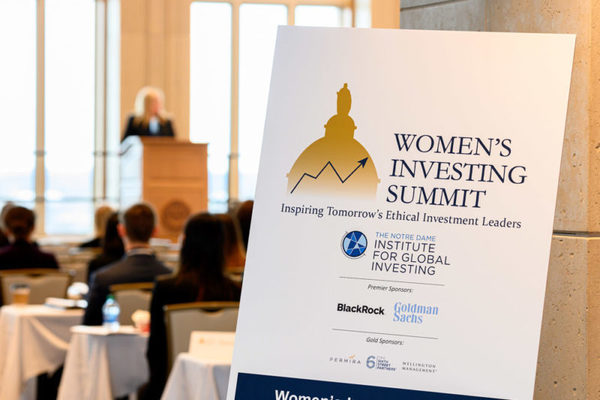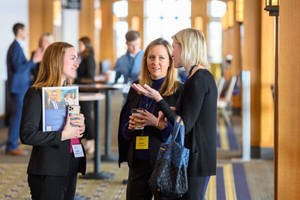
In 2020, NDIGI hosted the Women’s Investing Summit just before the pandemic halted in-person events. The Institute, however, didn’t halt but instead found new ways to offer students learning opportunities. Photos by Matt Cashore (ND ’94)
In February 2020, 25 top female financial executives from around the country traveled to South Bend to participate in the second annual Women’s Investing Summit. In an ornate ballroom overlooking Notre Dame Stadium, the executives spoke on subjects such as “Value Creation Through Active Management” and “Real Assets to Credit and Nuances in These Markets” to an audience of several hundred undergraduate and graduate students. The event was the brainchild of Erin Bellissimo, managing director of the Notre Dame Institute for Global Investing (NDIGI).

“I wanted to put all these smart, talented women up on stage so that women in the audience could go, ‘I’m as smart as her, I could do that,’ and men could go, ‘Oh, I could work for her, that’s totally normal,’” Bellissimo said. “It was a bit of a Jedi mind trick approach to the diversity issue.”
Few people in the room that day realized this would be one of Notre Dame’s last large-scale events for over a year. COVID-19 swept across the U.S. just a few weeks later, forcing the University to send students home for virtual instruction.
Bellissimo and NDIGI quickly realized they needed to completely rethink their programming for the duration of the pandemic. To help students understand and navigate the economic disruption, NDIGI set up a password-protected website with curated resources including articles, videos, book recommendations and podcasts. More than 330 students signed up for the site, which became a virtual community where they could discuss and engage with the content.
“There was a lot of misinformation, confusion and anxiety, so our goal was to bring good information to the student population and create a learning opportunity,” Bellissimo said. To replace one-on-one advisory meetings with students, she and NDIGI associate director Mark Dumich began holding a series of Zoom sessions to answer student questions and address their concerns. “The first thing we asked was, ‘Are you okay? Do you need anything?’ Bellissimo recalled. “You know, forget the investment stuff — if you need help, let us know.”
Outside of personal health concerns, students expressed worries about the pandemic’s impact on summer internships. Internships at major financial institutions are a key stepping stone into the profession, providing real-world experience and often leading to job offers. But as company after company canceled their program, students were left worrying about their career prospects.
“One of the initial things we heard last spring was that, you know, no one’s going to hold it against the student for having a gap in their résumé where you would traditionally see an internship,” Dumich said. “But we saw that as a way we could set Notre Dame students apart.”
To replace the traditional summer programs offered by financial firms, Bellissimo and Dumich designed the Virtual Internship Program (VIP). The 115 students who signed up received access to Wall Street Prep, a rigorous online program that teaches financial modeling; heard from two Zoom guest speakers a week; and completed capstone projects that ranged from preparing an investment thesis to researching the economic impact of COVID-19 on a particular business sector.
Another 166 students participated in the Virtual Investing Bootcamp Experience (VIBE), which was identical to the VIP except for the lack of a capstone project. The student feedback from the two programs was so positive that NDIGI plans to continue offering these virtual internships even after the pandemic ends.
“We could have gotten away with not doing something this summer,” Dumich said, “but we saw these virtual internships as a way to set Notre Dame students apart from the crowd. This will give them something to talk about in a job interview, and also help them with career discernment.”
When classes resumed on campus in fall 2020, NDIGI had to pivot once again. Because guest speakers could no longer fly to campus, Bellissimo and Dumich arranged for a series of senior-level finance practitioners to hold one-on-one Zoom sessions with students. Among the practitioners were Goldman Sachs vice president Jessica Mattes, Sixth Street investor Jenny Walsh and RoundTable Healthcare Partners senior advisor David Koo.

NDIGI took advantage of the University’s extended winter break to offer several Winter Session programs including a 1-credit investing case studies course and virtual career treks for first-year students.
They also used this time to focus specifically on offering career discernment support to students from historically underrepresented groups in the world of asset management. The session, called Investment Management Access Program (IMAP), was open to undergraduates affiliated with several partner student clubs, including ALPFA, AnBryce Scholars, Black Business Association of Notre Dame, BlackND Capital, First Gen Careers Initiative, Smart Woman Securities and Undergraduate Women in Business. Students did not need to be at Notre Dame in order to participate.
In all, 85 Notre Dame students and 53 students from 15 other schools participated in the program and gained access to Wall Street Prep’s online curriculum and met with a series of guest speakers. Students were also assigned to work on a project in partnership with an investment firm with the goal of gaining further insight into the day-to-day activities and career opportunities that exist in the field of asset management.
Needless to say, this year’s Women’s Investing Summit looked very different from 2020. Rather than hold the event on a single day, Bellissimo and Dumich spread the Zoom sessions out over the course of a week, from March 8 to 12. Among the 13 speakers, only Katie Koch (ND ’02), the co-head of fundamental equity at Goldman Sachs, returned from last year. “We’re really trying to build the Notre Dame ecosystem,” Bellissimo explained. “By bringing new speakers into the fold, they can see what we’re doing, and our students can see what they’re doing.”
Few of the sessions addressed the pandemic directly, focusing instead on investing fundamentals and asset management strategies — topics designed to appeal to students considering a finance career. But on the final day of the conference, Krystal England, managing director and head of hospitality at Canyon Partners real estate, gave a well-received talk — “Hospitality Investments: Recovering from the Perfect Storm” — that explored how hotels companies have tried to survive the prolonged freeze in tourism and business travel.
As it did in 2020, NDIGI partnered with Notre Dame’s Investment Club to host a Student Stock Pitch Competition. Students submitted their initial pitch materials in October, then advanced through multiple rounds of competition to reach the finals. On the evening of March 11, the three finalists presented their pitches to a panel of judges, including representatives from the Notre Dame Investment Office. The winners were Sofia Cruzat (BBA ’22) and Jacqueline Fletcher (BBA ’22) for their pitch on Micron Technology, a memory and storage solutions company.
Bellissimo and Dumich said they looked forward to a more normal-looking 2021-2022 school year, although they will also continue a few of the virtual programs they developed during the pandemic, such as the virtual internships.
“The Notre Dame ecosystem has tremendous advantages, and we just want to leverage those advantages for our students,” Bellissimo said. Just as in finance, “it’s about looking at your assets and taking advantage of them.”